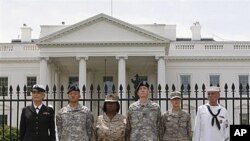The U.S. Defense Department says it has told military recruiters to begin processing applications from potential recruits who state they are homosexual. Tuesday's announcement was in response to a court order by a federal judge who suspended the Pentagon's policy that requires homosexual service members to keep their sexual orientation a secret, and bans recruiters and commanders from asking about it. Meanwhile, the judge has indicated that she will turn down the Obama administration's request for a stay of last week's ruling that ended the expulsion of gays from the U.S. military. President Barack Obama now finds himself in a paradox; urging Congress to repeal the law, while defending it in court.
Enacted in 1993, the law known as "Don't Ask, Don't Tell" allows homosexuals to serve in the U.S. armed forces as long as their sexuality remains secret. President Barack Obama says the law is discriminatory and detrimental to national security, as it has led to the expulsion of more than 14,000 military personnel
"This policy will end, and it will end on my watch," said President Obama.
Last week, a federal judge found "Don't Ask, Don't Tell" unconstitutional, and ordered the military to halt all investigations and discharges of gay service members. Civil-rights groups urged the White House to accept the ruling and decline to appeal, effectively killing "Don't Ask, Don't Tell."
But President Obama says he is duty-bound to defend existing laws in court - even laws he wants to end. "I do have an obligation to make sure I am following the rules. I cannot simply ignore laws that are out there. I have to make sure they are changed."
And the path to change, according to the president, is through Congress.
The House of Representatives already has voted to repeal "Don't Ask, Don't Tell" - but just weeks ago the U.S. Senate failed to overcome a Republican filibuster of a defense bill that included repeal of the law.
The White House continues to insist the law will end, but sources on Capitol Hill are not so sure. A spokesperson for Senate Majority Leader Harry Reid said there are "no guarantees" the votes will materialize to repeal the law in a post-election session of Congress or next year, when Republicans are expected to have more seats in both chambers.
Arizona Republican Senator John McCain, who led the procedural maneuver blocking debate on ending "Don't Ask, Don't Tell" last month, has pledged to do so again in December. "Absolutely. I will filibuster or stop it from being brought up."
Congressional observer Norman Ornstein of the American Enterprise Institute doubts Senate Democrats will overcome another filibuster in the so-called "lame duck" session of Congress.
"There simply will not be the time or the inclination to take this all the way to the limit," said Ornstein. "And so I suspect we are going to have to wait for another day to see a real resolution of the 'Don't Ask, Don't Tell' question."
In fact, some advocates for gay service members fear the best chance for repealing the law may be over.
Servicemembers United director, Alex Nicholson, is a former Army intelligence specialist and Arabic linguist who was discharged under "Don't Ask, Don't Tell" in 2002.
Nicholson believes President Obama genuinely wants to change the law, but has not been aggressive enough in fighting for it. But Nicholson has not abandoned hope entirely, noting that a Pentagon study on the impact of repealing the law is due in December.
"Although we are not as optimistic about getting repeal of 'Don't Ask, Don't Tell' in the next Congress, one thing we will have on our side is this [Pentagon] report," said Nicholson. "And so if in the next Congress we tackle 'Don't Ask, Don't Tell,' we will have a road map from the military laying out all the issues they may have to deal with, with existing contingency plans for dealing with those issues."
Nicholson hopes the report will allay concerns among moderate Republicans in the Senate who say the ban is unjust, but nonetheless voted to sustain last month's filibuster.
Nicholson also said he would prefer President Obama not defend "Don't Ask, Don't Tell" in court.
Georgetown University constitutional law professor Susan Bloch says, however, the president's hands are tied. "It is the tradition that the administration will defend the law in most cases. And the challenge in the "Don't Ask, Don't Tell" law is a challenge of the individual rights of the service members, not a constitutional challenge to executive power."
Meanwhile, the United States is witnessing, and the U.S. military is experiencing, the de facto halt of the "Don't Ask, Don't Tell" law.
For years, defenders of the policy predicted chaos and dissension in the armed forces if gay discharges were halted. A Pentagon spokesman said Monday that no disciplinary problems or mass-resignations have been reported since last week's judicial injunction.
Public-opinion polls show roughly three-fourths of Americans support allowing gays to serve openly in the military.
Judicial Battle Continues Over Repeal of Openly-Gay Military Service Ban




